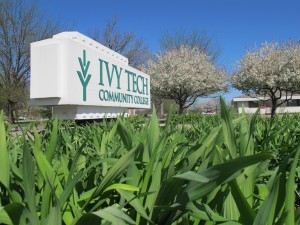Failure To Launch? Community College Students Can't Meet Higher Goals
For-profit colleges may be taking their lumps these days, but federal data released last week suggest community colleges have a problem of their own:
Students aren’t meeting their own goals for earning degrees.
Compared to the early 90’s, more community college students entered school this century aspiring to degrees higher than a bachelors’, the data show. But after five years, fewer students have earned a certificate of any sort.
Here are some of the findings from the report, released last Wednesday by the National Center for Education Statistics, comparing community college students entering school in 1989-90, 1995-96, and 2003-04:
- Students are aiming for higher degrees. 44.1 percent of students entering community college for the first time in 2003-04 aspired to earn “above a bachelors’ degree,” compared to less than one-third of students in 1989-90.
- Fewer students earned a diploma within five years. By 2009, one in five students who started in 2003-04 had attained a certificate, bachelors’, associates’ degree. Compare that with 37.7 percent of students who started in 1989-90 who earned a certificate or better by 1994.
- Transfers to four-year colleges earning fewer degrees. In 2008, 44.9 percent of community college students who transferred to a four-year college had earned a degree or certificate within five years. In 1994, that figure was 60.7 percent.
- Six-year completion rates worse among lower incomes. In 2001, 38.9 percent of students in the bottom 25 percent of total income had completed a certificate or degree within six years. By 2009, that figure was 29.8 percent.
To some community college administrators, these numbers reflect a sobering reality: community colleges have to do better at getting students across the finish line.
As Jack Scott, chancellor of the California Community College system, told the San Diego Times-Union:
Student success is the number one issue among community colleges throughout the nation. The Obama administration made it very clear that they wanted to see a greater degree of college completion. In our younger population — 25 to, say, 40 years of age —we’re not leading the world anymore in college education. We led the world, if you go up to, say, 45 to 64. We don’t anymore in our younger group because other nations are moving very rapidly because they understand that if they’re going to compete in a global economy that education is the key.
Performance among Indiana’s certificate- and associates’ degree-seeking students seems to echo these underwhelming figures for community colleges.
The National Center for Higher Education Management Systems reports 56.4 percent of Indiana students seeking four-year degrees finish within six years, slightly better than the U.S. average. But not even a quarter of Indiana students working towards two-year degrees finish within three years — below the national average.
Where Does Ivy Tech Fit In?
At Ivy Tech Community College’s Central Indiana campus in Indianapolis, 5 percent of students graduated on-time.
A quarter of Ivy Tech Central Indiana students transferred to another institution. What happened once they arrived?
An Indiana University report found Ivy Tech students who transferred to an IU campus continued their studies at the same rate as other transfer students, but often didn’t earn grades as high as their peers:
Transfer students who last attended Ivy Tech and those who most recently attended another postsecondary institution return for at least one semester during their next year (or graduate) at IU at about the same rate…
At Bloomington and Southeast, Ivy Tech transfers have significantly lower retention rates than other transfer students, whereas at IUPUI and Kokomo, Ivy Tech transfers have significantly higher retention rates than other transfer students.
Transfer students from Ivy Tech earn an average cumulative GPA of 2.46 during their first year at IU. The average cumulative GPA for transfer students who previously attended other postsecondary institutions is 2.69, for a difference of 0.23…
Ivy Tech transfers at Bloomington, IUPUI, Northwest, South Bend, and Southeast have significantly lower cumulative GPAs than other transfer students on those campuses…
Ivy Tech has sought to improve its course offerings by overhauling its remediation programs. The community college system is using a $1 million grant to pilot a new system for remediating students while simultaneously preparing them for college-level courses.
Teresa Lubbers, Indiana’s Commissioner for Higher Education, says Ivy Tech’s remediation redesign will, in part, keep at-risk students from falling through the cracks.
“You have either high school students coming to Ivy Tech not prepared academically, or an adult population coming back unprepared and needing to take these remediation courses. They’re often not successful,” Lubbers tells StateImpact.


